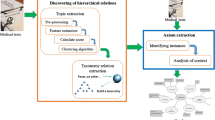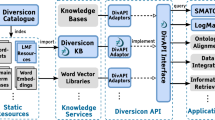Abstract
In recent years, we have been developing a new framework for acquiring medical knowledge from Encyclopedic texts. This framework consists of three major parts. The first part is an extended high-level conceptual language (called HLCL 1.1) for use by knowledge engineers to formalize knowledge texts in an encyclopedia. The other part is an HLCL 1.1 compiler for parsing and analyzing the formalized texts into knowledge models. The third part is a set of domain-specific ontologies for sharing knowledge.
Similar content being viewed by others
Explore related subjects
Discover the latest articles, news and stories from top researchers in related subjects.References
Beck M, Haugsjaa E. Applications of AI in Education. ACM Crossroads Article, 1996.
Bowden P R, Halstead P, Rose T G. Extracting conceptual knowledge from text using explicit relation markers. In Advances in Knowledge Acquisition, Shadbolt N, Ohara K, Schreiber G (eds.), Lecture Notes in Artificial Intelligence, Springer-Verlag, Berlin, 1996, Vol.1076, pp.147–162.
Cao C G. Student belief system and its application in intelligent tutoring. InProceedings of the 6th National Joint Conference on Artificial Intelligence, 2000, pp.51–58.
Delisle S, Barker K, Copek T, Szpakowicz S. Interactive semantic analysis of technical texts.International Journal of Computational Intelligence, 1996, 12: 273–306.
Gomez F. Acquiring knowledge about the habitats of animals from encyclopedic texts. InProceedings of the Workshop for Knowledge Acquisition (KAW-95), 1995, Vol.1, pp.1–22.
Gomez F, Hull R, Segami C. Acquiring knowledge from encyclopedic texts. InProceedings of the 4th Conference on Applied Natural Language Processing (ANLP94), 1994, pp.84–90.
Hahn U, Romacker M, Schulz S. Discourse structures in medical reports—Watch out! The generation of referentially coherent and valid text knowledge bases in the MEDSYNDIKATE system.International Journal of Medical Informatics, 1999, 53: 1–28.
Hahn U, Schnattinger K. Towards text knowledge engineering. InProceedings of the 15th National Conference on Artificial Intelligence and 10th Conference on Innovative Applications of Artificial Intelligence, Cambridge, MA: AAAI Press/MIT Press, 1998, pp.524–53.
Hahn U, Schnattinger K. Deep knowledge discovery from natural language texts. InProceedings of the 3rd International Conference on Knowledge Discovery and Data Mining, Heckerman D, Mannila D, Pregibon H, Uthurusamy D R (eds.), Menlo Park, CA: AAAI Press, 1999, pp.175–178.
Hahn U, Klenner M, Schnattinger K. Learning from Texts: A Terminological Metareasoning Perspective. In Connectionist, Statistical and Symbolic Approaches to Learning for Natural Language Processing, Wermter S, Riloff E, Scheler G (eds.), Lecture Notes in Artificial Intelligence, Vol. 1040, Springer-Verlag, Berlin, 1996, pp.453–468.
Hahn U, Romacker M. Content management in the SYNDIKATE system—How technical documents are automatically transformed to text knowledge bases.IEEE Transactions on Data & Knowledge Engineering, 2000, 35: 137–159.
Hull R, Gomez F. Automatic acquisition of biographic knowledge from encyclopedic texts.International Journal of Expert Systems with Application, 1999, 16: 261–270.
Kazawa K, Fujimoto K, Matsuzawa K. Attribute dependency acquisition from formatted text. InProceedings of the 3rd International Conference on Knowledge-Based Intelligent Information Engineering Systems, 1999, pp.464–468.
Lapalut S. Text Clustering to Help Knowledge Acquisition from Documents. In Advances in Knowledge Acquisition, Shadbolt N, Ohara K, Schreiber G (eds.), Lecture Notes in Artificial Intelligence, Vol.1076, Springer-Verlag, Berlin, 1996, pp.115–130.
Lei Y X. Acquiring Military Knowledge from the Encyclopedia of China. InProceedings of the Sixth International Conferences for Young Computer Scientists, Hangzhou, China, 2001, pp.366–370.
Plant R T. Techniques for knowledge acquisition from text.International Journal of Computer Information Systems, 1994, 35: 64–70.
Lu R Q, Cao C G. Towards Knowledge Acquisition from Domain Books. In Current Trends in Knowledge Acquisition, Wielinga B, Gaines B, Schreiber G, Vansomeren M (eds.), Amsterdam: IOS Press, 1990, pp.289–301.
Lu R Q, Cao C G, Chen Yet al. A PNLU approach to ICAI system generation.Science in China (Series A), 1996, 38: 1–10.
Ning L, Cios K. Knowledge-based intelligent tutoring system.Lecture Notes in Computer Science, 1989, Vol. 360, pp.420–437.
Richardson S D, Dolan W B, Vanderwende L. MindNet: Acquiring and structuring semantic information from text. InProceedings of the 36th Annual Meeting of the Association for Computational Linguistics and 17th Internationll Conference on Computational Linguistics, ACL, 1998, CONF 17, Vol. 2, pp.1098–1102.
Sato H, Fujimoto K. A new approach to semantic word-matching for knowledge acquisition from text containing daily-used words. In Advances in Intelligent Systems: Theory and Applications, Mohammadian M (ed.), Frontiers in Artificial Intellligence and Applications, 2000, Vol.59, pp.135–140.
Schmidt G. Knowledge Acquisition from Text in a Complex Domain. InThe 5th International Conference on Industrial and Engineering Applications of Artificial Intelligence and Expert Systems, Belli F, Radermacher F J (eds.), Lecture Notes in Artificial Intelligence, Vol.604, Springer-Verlag, Berlin, 1992, pp.529–538.
Tschaitschian B, Abecker A, Schmalhofer F. Information Tuning with KARAT: Capitalizing on Existing Documents. In Knowledge Acquisition, Modeling and Management. Lecture Notes in Artificial Intelligence, Plaza E, Benjamins R (eds.), Vol.1319, Springer-Verlag, Berlin, 1997, pp.269–284.
Author information
Authors and Affiliations
Corresponding author
Additional information
This work is supported by a grant from the Chinese Academy of Science (No.#2000-4010), and a grant from National Natural Science Foundation of China (No.#20010010-A), a grant from the Ministry of Science and Technology (#0221CCA03000).
CAO Cungen is a professor of artificial intelligence. His main interests include knowledge acquisition and knowledge-based systems.
Rights and permissions
About this article
Cite this article
Cao, C. Extracting and sharing knowledge from medical texts. J. of Comput. Sci. & Technol. 17, 295–303 (2002). https://doi.org/10.1007/BF02947307
Received:
Revised:
Issue Date:
DOI: https://doi.org/10.1007/BF02947307




